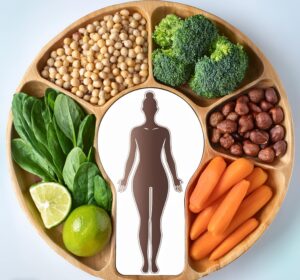Introduction to Micronutrients intake Guide and Their Importance in our Body:
As the body requires a small quantity of them for its normal activities, micronutrients are often referred to as trace vitamins and minerals. They are unlike macronutrients like carbohydrates, proteins, and fats which are sources of energy, but rather aid in the maintenance of the various physiological activities in the body.
- Vitamins: Such as vitamin A, vitamin C, vitamin D, vitamin E, vitamin K and vitamins of group B. Each vitamin is notable and performs different functions such as boosting the body’s immune system, strengthening the bones and assisting in the production of energy.
- Minerals: The basic minerals required are Calcium, Iron, Magnesium, Potassium and Zinc. These substances contribute to the strength of bones, transport of oxygen, movement of muscles, and propagation of nerves.
Lack of the above medicines will cause dire consequences, for example low immunity function and deteriorated body structures, as well as diseases. Hence for one to be free from such problems, proper nutrition containing various micronutrients is very important.
Understanding the Role of Micronutrients intake Guide in the Body:
These are referred to as vitamins and minerals that are needed in a small quantity for the physical activities to be performed in an optimal manner. They play crucial roles in various bodily processes.
- Vitamin A: Enables vision, activation of immune response, communication of cells.
- Vitamin C: An antioxidant which participates in collagen biogenesis and improves iron digestion.
- Iron: An important component in the transportation of oxygen in the blood and creating energy.
- Calcium: Important in bone formation, in the muscles as well as in nerve activity.
- Zinc: Helps in the immune system, healing processes and in the synthesis of DNA.
- Magnesium: Participates in more than 300 biological processes including muscle and nerve function.
Lack of these micronutrients, can lead to severe health ailments, indicating their flection or insufficiency.
Leafy Greens: Vitamin Packed Foods (Green Vegetables)
Of all foods, leafy greens and other vegetables are the most concentrated in nutrients. These vegetables contain a long range of vitamins that are needed in the body for normal health.
Vitamins Under Leafy Vegetables:
- Vitamin K: Vital for protection against excessive bleeding (blood clotting) & proper formation of bones.Very high percent with in kale spinach and collard greens.
- Vitamin A: Necessary for normal vision, immune function, and skin health. Found abundantly in fruits and vegetables: Swiss chard, turnip greens etc.
- Vitamin C: Enhances immune system as well as being a cofactor in collagen synthesis. Present in plentiful in Musataard greens and turnips green.
- Folate (Vitamin B9): Helps in the synthesis of DNA and dealing with cell damage. High volume in spinach and romaine lettuce.
Distinct Leafy Greens:
- Kale: Has a high level of vitamins K, A, and C.
- Spinach: Iron and folate rich.
- Swiss Chard: Contains vitamins K, A, and magnesium.
- Collard Greens: Contains calcium, vitamin K, and dietary fiber.
Achieving the required levels of vitamins is possible by eating a good mix of leafy vegetables.
Nuts and Seeds: Tiny But Mighty
Even though these foods may be little, the nutrients that they contain are in plenty. They are excellent sources of essential micronutrients like vitamins and oils and other fats like triglycerides.
- Almonds: Very good supply of vitamin E, magnesium, and fiber.
- Chia Seeds: Good sources of omega-3 acids, calcium, and fibers.
- Walnuts: Contains omega-3 acids, manganese as well copper.
- Sunflower Seeds: Contains vitamin E and selenium as well as magnesium.
Addition of nuts and seeds into the diet could assist in attaining the proper concentrations of needed micronutrients for better health.
Berries: A Colorful Source of Antioxidants
Berries are also loaded with a lot of micronutrients like vitamins and important minerals. They have notable levels of antioxidant activity, which refers to compounds that protect the body from free radicals, thereby lowering oxidative stress levels. Berries also contain other nutrients composed of:
- Vitamin C: vitamin C has been shown to help the immune system and the skin.
- Fiber: it is known to help with digestion and in the maintaining of a healthy gut.
- Anthocyanins: anthocyanins contain potent anti-oxidative properties that are heart protective in nature
Popular kinds of berries: A few are:
- Blueberries: They are an excellent source of vitamin C and vitamin K.
- Strawberries: They are a great source of manganese.
- Raspberries: They are a great source of dietary fiber. Eating berries of different kinds improves health.
Whole Grains: More than a Fiber type
Whole grains are nutrient-dense food sources rather than only a source of fiber alone. These are also rich with B vitamins such as niacin, thiamine and folate all of which help in energy metabolism and formation of red blood cells. There are other minerals such as iron, magnesium and selenium that are found in small quantities in whole grains which also help in the immune system and transport of oxygen.
Key Benefits:
- B vitamins: Increase energy levels in the body.
- Iron: Involved in the carriage of oxygen.
- Magnesium: Assists the functionality of muscles and nerves.
- Selenium: Strengthens the body’s defensive aggregates against harmful oxidants.
Diets enriched with whole grains regionally such as oats, quinoa and brown rice provide a constant supply of these important Micronutrients intake Guide.
Dairy Products: Thus, calcium, yes, but it is not all
Most people relate dairy products to high in calcium which is important for healthy bones. However, there are dairy products that do not only contain calcium and many others are equally important.
- Protein: Important for the repair and growth of muscles.
- Vitamin D: Important for the absorption of calcium as well as bone health.
- Potassium: Regulates blood pressure within normal level.
- Phosphorus: It works together with calcium to help build and protect bones and teeth.
- Vitamin B12: A vitamin important for the production of red blood cells and neurological function.
This is why including dairy in one’s diet can promote health as it provides these important micronutrients that also perform several other functions in the body apart from the maintenance of the skeletal system.
Fish: Omega-3 Fatty Acids and Essential Vitamins
Meat is a great source of omega-3 fatty acids, which are important for the heart as well as brain functions. The intake on a more regular basis helps in the provision of cardiovascular health benefits and lowering the level of triglyceride and controlling blood pressure.
- Rich in Omega-3: Certain types of fish particularly salmon, mackerel, and sardines are very rich in omega-3 fatty acids.
- Vitamins: Fish is also a rich source of vitamin D, riboflavin, and B12 that are vital in formation of bones, metabolic energy and formation of red blood cells respectively.
It may be that, because of this high level of micronutrients, there are health benefits afforded from eating fish.
Doses above this can lead to enhanced benefits in addition to what has been described above at least two servings of fish should be taken per week.
Legumes: Protein and Micronutrients intake Guide
Legumes are highly nutritious foods and substantially help improve healthy living. Some of the important nutrients we find in legumes include:
- Protein: Legumes are important muscle builders and regenerators as they consist of ample amounts of protein vegetarian.
- Fiber: The high level of fiber content helps on the gastrointestinal system as well as on sugar control in the blood stream.
- Folate: Important for the formation of DNA, haemopoiesis as well as in the prevention of neural tube defects in foetus during pregnancy.
- Iron: Important in the process of respiration as a carrier of oxygen as well as producing energy.
- Potassium: Reduces the risk of high blood pressure and helps in the proper maintenance of fluid balance thus protecting the heart.
Presence of legumes broadens the scope of food and helps to provide a wide range of important nutrients and proteins.
Eggs: Anadewus Nutrient/ Food
Eggs are rich in essential supports needed by the body and has so many merits to the health.
- Protein: Roughly about 6 grams of protein a single egg should be enough per day since the protein is important for the body muscles’ growth and recovery processes.
Vitamins:
- Vitamin A: Enhances vision as well as immune response.
- Vitamin B12: Needed for everyday maintenance of the nervous system and formation of blood cells.
- Vitamin D: Helps to strengthen bones through calcium utilization.
Minerals:
- Selenium: Functions to eliminate free radicals.
- Choline: Important for the brain growth and functioning.
- Healthy Fats: Includes omega-3 fats that are friendly to the heart.
The presence of eggs in the meals brings simplicity as well as nutrients which are important for body health.
Vitamin C and Other Micronutrients Present in Citrus Fruits:
It is widely known that citrus fruits like oranges and lemons, and grapefruits contain a high proportion of vitamin C. In addition to vitamin C, other essential and useful elements and antioxidants are also available.
- Vitamin C: Enhances immune systems, helps synthesize collagen, and facilitates iron hydrolysis.
- Fiber: Assists in digestion and weight control.
- Potassium: Helps control blood pressure and fluid levels for the benefit of heart health.
- B Vitamins: Such as thiamine and folate, are also required for energy metabolism.
- Flavonoids: Effective blood pressure regulating antioxidants that also assist in treating several cardiovascular diseases.
Dark Chocolate and Micronutrients intake Guide: A Pleasant Surprise
Dark chocolate is healthy and is loaded with various important micronutrients. It provides good levels of:
- Iron: Essential for erythrocytes development.
- Magnesium: Assists in controlling muscle movement and function including neurons.
- Copper: Important for iron absorption and synthesis of red blood cells.
- Manganese: Take part in the process of making bones healthy, sustaining nutrients in the body.
Furthermore, dark chocolate has beneficial features related to high amounts of antioxidant activity like flavonoids that are known to cure inflammation and promote positive effects on the heart. One should choose dark chocolate with the percentage of cocoa over 70%.
How to Include These Foods in Your Diet:
Always start the day with oatmeal and fresh blueberries for a rich content in fiber, vitamins, and antioxidant foods. These can be added to smoothies, salads, or steamed as a garnish. Incorporate lentils in soups, stews, or use them as an alternative for meat in tacos and burgers. Indulge in almonds or include them in yogurt and cereals. Sweet potatoes can be served in the form of fries as a side dish. Salmon should be integrated in meals at least weekly by broiling or baking it. Oatmeal, Greek yogurt and assorted fresh fruit can be a good way to start the day. Cholesterol and omega 3: Add chia seeds to your yogurt or include it in your smoothies.
Conclusion: The Attainability of a Micronutrients intake Guide
A diet that adequately incorporates foods high in micronutrients is likely to be beneficial to health in so many ways. People who want to increase their micronutrient consumption should focus on a wide variety of macronutrient-dense food sources. Some of the essential strategies are:
- Fruits and vegetable intake should be increased: These provide vitamins and minerals that are necessary for the body.
- Whole grains and shungiku need to be included: These contain important microfibers and micronutrients.
- Lean sources of proteins should be selected: These can help in increasing the intake of proteins with low fat content.
There is a reason to include oils in one’s diet as they are rich in essential fatty acids and vitamins. Consume oils such as above mention addition, we can significantly decrease the likelihood of deficiency in an individual’s micro nutrients which is a positive health outcome.

